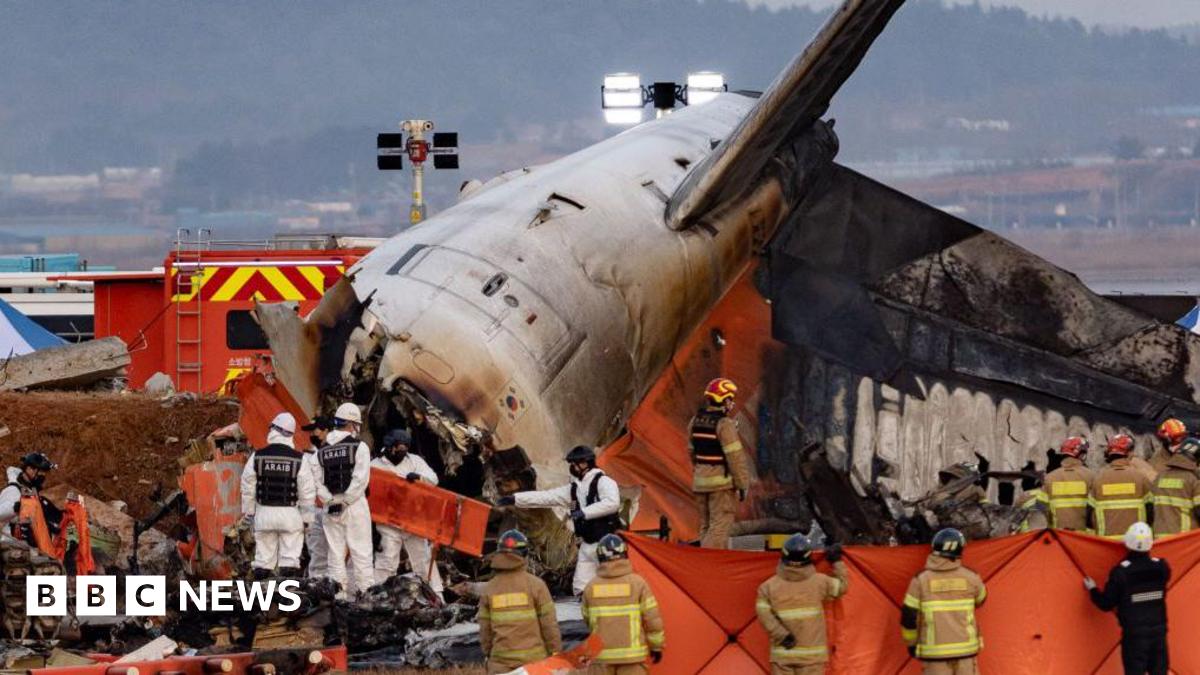South Korea's Airport Safety Changes After Tragic Jeju Air Incident

South Korea's Airport Safety Changes After Tragic Jeju Air Incident. Discover more detailed and exciting information on our website. Click the link below to start your adventure: Visit Best Website. Don't miss out!
Table of Contents
South Korea Bolsters Airport Safety Following Tragic Jeju Air Incident
A devastating accident involving Jeju Air has prompted sweeping changes to aviation safety protocols across South Korean airports. The incident, which involved [ insert brief, factual description of the accident without sensationalizing ], served as a stark reminder of the critical need for robust safety measures within the country's rapidly expanding aviation sector. This has led to immediate and significant changes aimed at preventing similar tragedies in the future. The South Korean government and aviation authorities are committed to enhancing passenger safety and regaining public trust.
Enhanced Safety Measures Implemented Across South Korean Airports
Following the Jeju Air incident, the Ministry of Land, Infrastructure, and Transport (MOLIT) has announced a series of crucial safety upgrades across all major South Korean airports, including:
- Strengthened Emergency Response Protocols: Airports are implementing revised emergency response plans, including improved communication systems, enhanced first responder training, and faster deployment of emergency medical services. These protocols are designed to minimize response times in the event of future incidents.
- Improved Ground Handling Procedures: A comprehensive review of ground handling procedures is underway, with a focus on preventing similar ground accidents. This includes stricter guidelines for aircraft maintenance, baggage handling, and ground crew operations.
- Technological Upgrades: Investments are being made in advanced technologies to improve safety, including updated surveillance systems, improved communication infrastructure, and the implementation of advanced data analytics for predictive maintenance.
- Rigorous Safety Audits: More frequent and stringent safety audits will be conducted at all airports, with a particular focus on adherence to international safety standards and best practices. These audits will cover all aspects of airport operations.
- Increased Pilot Training: The government is working with aviation training institutions to enhance pilot training programs, with a specific focus on emergency procedures and risk management.
Focus on Transparency and Public Accountability
The MOLIT has also emphasized the importance of transparency and public accountability in the wake of the Jeju Air accident. This includes:
- Public Release of Investigation Findings: A thorough investigation into the cause of the accident is underway, and the findings will be made publicly available to ensure transparency and accountability.
- Improved Communication with Passengers: Airports are working to improve communication with passengers during emergencies, providing clear and timely information to mitigate anxiety and panic.
The Path Forward: Strengthening South Korea's Aviation Safety
The Jeju Air incident serves as a critical turning point for aviation safety in South Korea. The swift and comprehensive response from the government demonstrates a commitment to learning from past mistakes and implementing robust preventative measures. While the investigation continues, the focus is firmly on enhancing safety standards to prevent future incidents and ensure the safety of all air travelers. These changes underscore South Korea's dedication to maintaining its reputation as a safe and reliable aviation hub.
Stay informed about the latest developments in South Korean aviation safety by subscribing to our newsletter (link to newsletter signup).

Thank you for visiting our website wich cover about South Korea's Airport Safety Changes After Tragic Jeju Air Incident. We hope the information provided has been useful to you. Feel free to contact us if you have any questions or need further assistance. See you next time and dont miss to bookmark.
Featured Posts
-
 Stream The Clippers Celtics Nba Game Your Ultimate Guide
Jan 24, 2025
Stream The Clippers Celtics Nba Game Your Ultimate Guide
Jan 24, 2025 -
 Dems Face Backlash The Laken Riley Act And The Immigrant Vote
Jan 24, 2025
Dems Face Backlash The Laken Riley Act And The Immigrant Vote
Jan 24, 2025 -
 Guarany De Bage X Internacional Escalacoes Confirmadas E Onde Assistir
Jan 24, 2025
Guarany De Bage X Internacional Escalacoes Confirmadas E Onde Assistir
Jan 24, 2025 -
 White House Orders Leave For All Federal Diversity And Inclusion Staff
Jan 24, 2025
White House Orders Leave For All Federal Diversity And Inclusion Staff
Jan 24, 2025 -
 Onde Assistir Arsenal X Dinamo Zagreb Horario E Escalacoes Confirmadas
Jan 24, 2025
Onde Assistir Arsenal X Dinamo Zagreb Horario E Escalacoes Confirmadas
Jan 24, 2025
